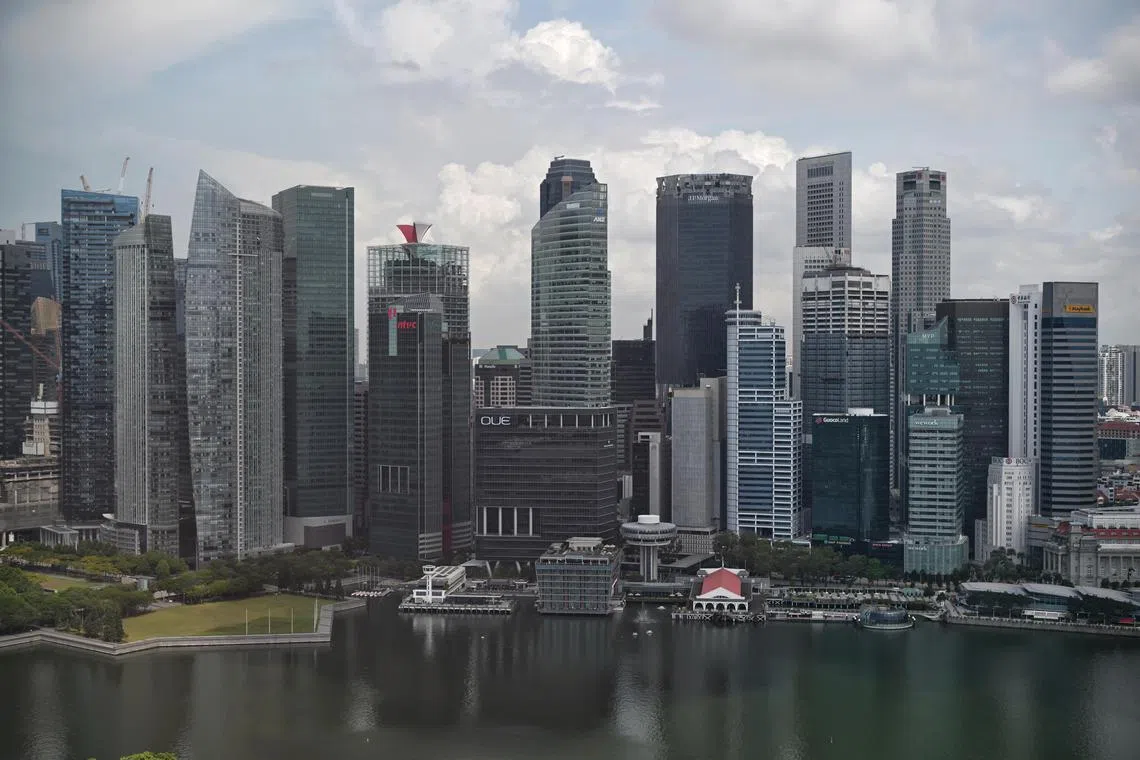Shareholder returns fall for South-east Asia conglomerates, including in S’pore: Bain
Sign up now: Get ST's newsletters delivered to your inbox

The report by Bain also found that “conglomerate premium” eroded first and fastest in developed markets such as Singapore, Malaysia and Thailand.
ST PHOTO: KUA CHEE SIONG
Follow topic:
SINGAPORE – Total shareholder returns from conglomerates have fallen sharply over the past decade as companies struggle to adapt to the lower growth environment, a new study has noted.
It found that average annualised total shareholder returns (TSR) were 4 per cent in the period from 2013 to 2022, a 24 percentage point decline compared with the decade 2003 to 2012.
By comparison, “pure plays” enjoyed average annualised TSR of 11 per cent from 2013 to 2022, which was still 9 percentage points lower than the 2003 to 2012 period.
Pure plays – firms that operate in a single industry – outperformed conglomerates on revenue growth, margins and multiples, noted the report by the consultancy Bain & Company.
It also found that “conglomerate premium” eroded first and fastest in developed markets such as Singapore, Malaysia and Thailand, confirming a correlation between market maturity and conglomerate performance.
“Conglomerates struggled to adapt to the lower-growth environment, a result of global macroeconomic conditions which started in 2014,” said the report, now in its fifth edition.
“They were slower to expand margins or exercise cost discipline to offset revenue losses, and their price-earnings multiples contracted. In contrast, young and nimble pure plays were able to attract investors, government support and talent by developing strong leadership positions in attractive sectors.”
The report highlighted that pure plays responded more quickly in the downturn, maintaining revenues and lowering costs and, in turn, achieving higher TSR than conglomerates.
Conglomerates make up a major segment of the South-east Asian economy, accounting for 17 per cent of market cap and 30 per cent of capital expenditure. Hence, their health is often seen as a barometer of the region’s economic health.
Conglomerates in Singapore are largely built around property, infrastructure and energy businesses, with their total market cap accounting for a third of the Singapore Exchange. Most trade below their net tangible value per share, a phenomenon known as the “conglomerate discount”, which averages 20 per cent to 30 per cent.
This has prompted some like Singapore’s Keppel Corporation to restructure away from the conglomerate model
But not all regional conglomerates suffer the same slide in TSR.
“A subset of conglomerates known as ‘all-weather stars’ have consistently outperformed their peers and achieved top-quartile status for TSR growth across all economic cycles over the past 20 years,” said Mr Till Vestring, a Bain & Company advisory partner based in Singapore.
“Even in lower-growth environments, these conglomerates increased revenue, defended their margins and expanded multiples.”
Bain noted five imperatives for South-east Asian conglomerates to succeed.
The first is to reinvest in their core businesses and strive for market leadership.
Second, they should reshape their portfolios towards high-growth industries and growth engines of the future.
The third imperative is to redefine and reshape the “corporate centre’s” role and how it distinctively adds value.
Bain identified two opposing approaches for corporate centres. The first is a hands-on strategy where the centre actively adds value to each business, so the value of the group becomes greater than the sum of its parts.
The best centres pick their battles and develop distinct capabilities to capture synergies and support their portfolio companies.
In the other approach, the centre acts solely as an investment manager. No synergies are sought or extracted from the businesses because each company is independently strong and has sufficient scale and capabilities to compete on its own.
The centre makes buy/hold/sell decisions, puts high-quality management teams in place and fosters the right performance dialogue with each business unit. Conglomerates need small, disciplined and highly skilled staff at the centre for this approach to work.
“Which model is more suitable will depend on each group’s specific circumstances, but clarity on where and how to add value from the centre is paramount,” Bain noted.
The fourth imperative calls on conglomerates to invest heavily in technology and, in the process, be experts at using data analytics and automation to maximise top- and bottom-line productivity.
Finally, they must optimise their capital structures to reduce the conglomerate discount.
Bain & Company noted that as South-east Asia’s economies and capital markets matured, investors have punished conglomerates, discounting their value by 7 per cent to 43 per cent compared with the sum of their parts.
It is this discount which has prompted the likes of Keppel and CapitaLand to restructure and recapture value.


